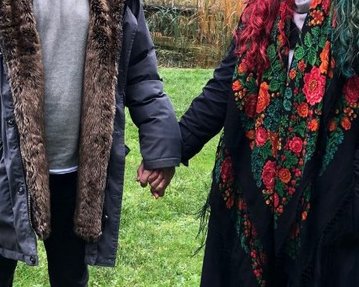
Baran and Milad (names changed by the editors) are from Tehran. Milad, 29, is studying music therapy, and 40-year-old Baran is studying dance and movement therapy; both have been here for just over a year. This is their story.
Baran and Milad (names changed by the editors) are from Tehran. Milad, 29, is studying music therapy, and 40-year-old Baran is studying dance and movement therapy; both have been here for just over a year. This is their story.
Baran and Milad cancelled their first appointment at short notice. They have been too emotionally affected, too entangled in worry and fear. Finally, on the second attempt, I met the two students from Iran to talk to them about the situation in their home country, to listen to them, to understand their lives to some extent. Milad seems rather introverted. Baran, with her colourful hair, is more open. But you can see it in both of them: they yearn to tell their story. For them, it is one of the few opportunities to stand with their families and friends in Iran.
It is not about accommodating the West
The protests in Iran continue to rage on, the Islamic Republic is still beating its own people because they do not want to wear the compulsory hijab and abide by the government’s rules. They are like Jina Masha Amini, the young Kurdish woman who, visiting Tehran on 13 September, was not wearing the hijab properly. She was arrested and beaten so severely that she died shortly afterwards in police custody. Her death sparked the powder keg; since then, thousands of Iranians have taken to the streets every day. It is not just the headscarf, Sharia, laws like the death penalty, or a few more liberties, nor is it about accommodation to Western culture – it is the entire system that the people of Iran are rising up against on the streets, running the risk of being arrested, beaten up, or even killed.
More than just protests
“The current situation has been triggered by past years, it’s all coming up again.” Baran grew up with this fear. In 1979 (replacement of the monarchy by the Islamic Republic), 1999, 2009, 2019 – people in Iran have protested many times before, but never on this scale, encompassing all strata of society, in many ways, in all parts of the 80-million-strong country. Then, the people were focused on reforms; now, they are focused on the obliteration of the Islamic State, which trades in sinister repression and violence. “Why have we tolerated this regime all these years?” the Iranian asks herself today. Her family and she herself were tired of war and revolution in the years before the revolution broke out in September. They hoped for reform, but nothing changed. Except for the worse. In September, with the protests just starting, Baran was in Iran for a few days, but then her brother sent her back to Germany, to safety: “You have to be our voice, you have to talk about what is happening here,” he told her.
“We are shocked. It is difficult to concentrate on other issues, on studies, on other things. At times I can’t stand other people around me either,” Baran says, rubbing her eyes. Her parents and older brother are still in Iran, and when the internet is working, they use every minute to talk to each other. Shutdowns of the internet have cut the two off from their country even more, and therefore less information about the situation there filters through to us. An additional drama that makes it even more important to talk about this issue.
“When I sit at the university, I ask myself: ‘why am I here?’” Milad says. He too has his parents and an older brother back home in Iran, and thinks of them constantly, going outside to protest almost every day. Both feel guilty when they think of their own situations, and yet at the same time it is so important at this time to stay strong, to earn a little money on the side, to do something for the future. Milad has been working as a music teacher, among other things. “Yesterday my cheeks really hurt,” he says. “They hurt from the fake smiles I put on in everyday life.”
Baran explained that she has lost a major part of her life, “Iran is my home. Leaving was really hard for me, and I want to go back, too.” Milad has been working with artists critical of the regime; he cannot go back, he is banned from his home country. So both Baran and Milad lead lives of disruption: mentally, they are always in Iran; physically, they are here in Germany. Turmoil has surrounded them throughout their lives. “We live two lives, we have a multiple identity,” Milad says. His father was a journalist, but is no longer allowed to work in this profession. At home, he explained the world to his son; the following day, he read the twisted truth from the regime’s perspective in the newspaper.
Helplessness
Sanctions don’t help – they only make the situation worse, Baran explained. “My family’s income fell by half as a result of them.” It might help a little to throw the Iranian ambassadors out of foreign countries. Otherwise, the only thing that can be done is to educate people about their situation. “Even if other people don’t want to hear it or see it: it is important to us that we are seen, that our anger, our sorrow, our pain are seen.”
Baran added, “One thing I have learned in the last few weeks is to say I need help, to say I feel weak.” Even their therapeutic studies do not help them much – they are a distraction at best. “I don’t want to feel helpless,” as Milad described it. “That’s why I make music, just to do something.”
Towards the end of our conversation, Milad’s brother called – apparently there was an internet connection just then, very weak. Milad jumped up and disappeared for a few minutes. Afterwards, during our short photo shoot at the Science Park, he reached for Baran’s hand. “My brother is doing well so far,” he reported. “He’s just preparing himself for the next protest, which takes place today.”


We condemn the brutal actions of Iran’s rulers against their own people. As staff and students, it is our humanitarian obligation to stand shoulder-to-shoulder with the Iranian people.
Social media channels of activists for the people in Iran:
The song (lyrics by Shervin Hajipour, translated by Zuzanna Olszewska) weaves together Twitter messages from Iranians explaining what the protest means to them.
For the Sake of… For the sake of dancing in the alleys | براى... برای توی کوچه رقصیدنبرای ترسیدن به وقت بوسیدن برای خواهرم خواهرت خواهرامون برای تغییر مغزها که پوسیدن برای شرمندگی برای بی پولی برای حسرت یک زندگی معمولی برای کودک زباله گرد و آرزوهاش برای این اقتصاد دستوری برای این هوای آلوده برای ولیعصر و درختای فرسوده برای پیروز و احتمال انقراضش برای سگ های بی گناه ممنوعه برای گریه های بی وقفه برای تصویر تکرار این لحظه برای چهره ای که میخنده برای دانش آموزان برای آینده برای این بهشت اجباری برای نخبه های زندانی برای کودکان افغانی برای این همه “برای” غیر تکراری برای این همه شعارهای تو خالی برای آوار خونه های پوشالی برای احساس آرامش برای خورشید پس از شبای طولانی برای قرصای اعصاب و بی خوابی برای مرد میهن آبادی برای دختری که آرزو داشت پسر بود برای زن زندگی آزادی برای آزادی برای آزادی برای آزادی |
Lyrics by Shervin Hajipour, translated by Zuzanna Olszewska
Discover your degree programme up close! Book your taster session now!